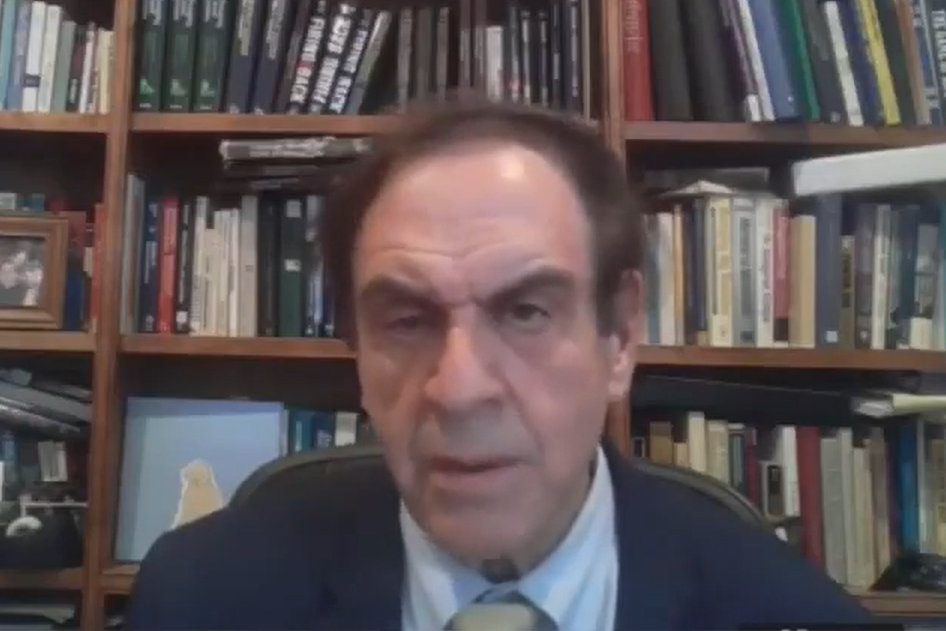The captains of American industry are privately worried that Donald Trump’s “chaotic” leadership and his “Maoist” MAGA movement are hurting the U.S. economy, according to a business professor renowned as the “CEO whisperer”.
In an op-ed for Fortune magazine on Sunday, Yale don Jefferey Sonnenfeld — known for his extensive contacts and regular closed-door summits with corporate bosses — said that CEOs at his latest get-together were “near unanimous” that Trump’s policies are damaging their bottom line.
Two thirds of the hundred-plus CEOs surveyed said that Trump’s tariffs had hurt their businesses, the article reported, with business leaders worried about his “hollowing out” of institutions and his repeated attempts to pressure the Federal Reserve.
“This widespread sentiment is directly counter to the heavily trumpeted ‘Dear Leader’ tributes of just a handful of tech titans, who are decidedly not representative of the leadership class,” wrote Sonnenfeld and his co-author Stephen Henriques (another Yale business expert).
In an interview with CNN, Sonnenfeld went further, saying Trump’s threat to American democracy was the single biggest factor cited by his focus group.

“Our CEO groups are around 70 to 75 percent Republican. They tell us — 80 percent — that they are disappointed with the performance of the economy under Trump,” Sonnenfeld said.
“They’ll go through specifics about what they don’t like about tariff policies, and the like, and the independence of the Fed. But more than anything else, it’s the corrosive effect, and the threat to the free enterprise system, of not having a functioning democracy.”
According toThe Daily Beast, he added that some CEOs were alarmed by the sudden suspension of Jimmy Kimmel’s talk show after threats from the Trump administration.
“It’s as if MAGA has gone Maoist, if not Marxist,” Sonnenfeld said.

Since returning to power in January, Trump has unleashed a whirlwind of new tariffs on foreign imports, with exact rates on particular countries often changing rapidly.
A federal appeals court ruled last month that his “Liberation Day” tariffs in April were imposed illegally, setting up a future showdown in the Supreme Court.
All of which has left business chiefs unsure what to do next and cautious of making any big investments in case the policy changes again, according to Sonnenfeld and Henriques.

At the Yale Chief Executive Leadership Institute’s 155th CEO forum, held under Chatham House rules so that participants could speak freely, there was wide agreement that Trump’s tariffs were so far doing more harm than good.
While many supported Trump’s stated goal of re-industrializing the country, fewer than half reported that they’d stepped up their investments in domestic manufacturing since “Liberation Day”, while still ranked their investments as significant.
Nearly three quarters of all executives surveyed said they believe Trump’s tariffs are probably illegal, creating even more uncertainty in their future plans.
More than three quarters were concerned about Trump’s attempt to pressure Federal Reserve chair Jerome Powell into cutting interest rates, with a majority saying they believed he had done lasting damage to the institution’s independence.

Some also cited Trump’s “quasi-socialist” intervention in business, such as his taking of a stake in Intel, his agreement to share Chinese revenues with AMD and Nvidia, and insistence on a so-called “golden share” — conferring powers above and beyond ordinary shareholders — in Nippon Steel’s acquisition of U.S. Steel.
“After nine months in office, there is a clear desire to return to a respect for the balance of powers in government, to reinforce international allies, to fortify independent, objective expertise of economists and scientists, to encourage freedom of voice, to stop bullying countries, cities, and companies into resentful, uneconomical compromises,” wrote Sonnenfeld and Henriques.
“In short, CEOs are calling to make America, America again.”
“When one commenter compared MAGA to the Maoist movement, there wasn’t an outcry of disagreement. Quite the opposite.”




